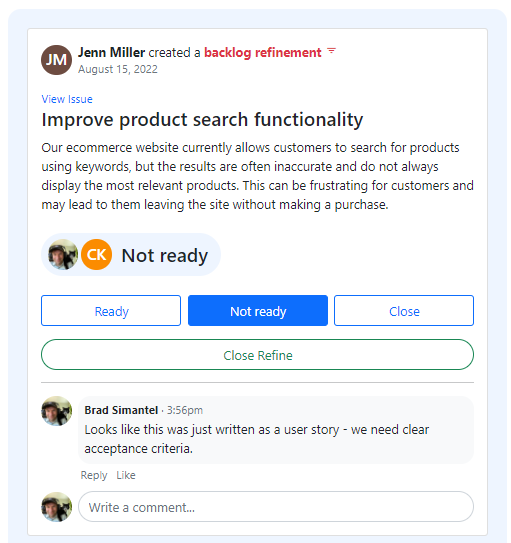Helpful summary
- Overview: Backlog refinement meetings are an important part of the agile development process, as they allow teams to prioritize and plan their work effectively. In this article, we discuss how we conduct these meetings in a way that maximizes productivity and collaboration.
- Why Trust Us: Our guidance is based on our experiences helping customers like Medium and T-Mobile optimize their Agile workflows.
- Why It Matters: Effective backlog refinement makes all the Agile workflow stages that follow run more smoothly. It’s a crucial stage to get right, and it’s one that many teams struggle with.
- Action Points: Skip unnecessary face-to-face meetings by using async backlog refinement tools like Teaminal and gain back hours of development time each week.
- Further Research: Explore how Teaminal can enhance your backlog refinement process, especially if your Agile team operates remotely.
Want to learn more about effective backlog refinement meetings?
Backlog refinement is an important Agile practice that involves reviewing and updating the product backlog to make sure it’s well-defined, prioritized, and ready for development. But backlog refinement meetings can often become time-consuming and inefficient.
In this Teaminal guide, we share tips and strategies to make your backlog refinement meetings more effective and productive. By implementing these practices, you can save valuable development time and keep your team on track towards achieving your project goals.
Let’s begin!
Why listen to us?
At Teaminal, we’ve helped Agile teams at high-performing companies like Angi, Medium, Hello Fresh, and Workday optimize their backlog refinement meetings and streamline their Agile processes.

We understand the importance of efficient backlog grooming for project success and have honed our techniques through years of experience working with these top companies.
What is a backlog refinement meeting?
A backlog refinement meeting is an Agile workflow stage where the product owner (and often a group of developers) review, define, prioritize items in the product backlog.
This process of backlog refinement or grooming helps to make sure that the backlog is well-organized, prioritized, and contains items that are clear and ready for development. That last part is crucial—a well-refined backlog means that there’s minimal planning that needs to be done at the start of each sprint.
Typically, these meetings are synchronous.
At Teaminal, we optimized backlog refinement meetings by making them asynchronous and remote-friendly. Our platforms automatically surfaces backlog items, organizes the discussion around acceptance criteria, supports story point voting, and more—all without time-consuming face-to-face meetings.
Benefits of effective backlog refinement meetings
Win back wasted time
Agile workflows are efficient, but there’s almost always room for improvement. And poorly groomed backlogs are one of the biggest inefficiencies we see at Teaminal. Taking the time to streamline your backlog refinement process can save hours of wasted time in ineffective meetings and directionless sprint planning.
Improve collaboration
Backlog refinement is an important part of the Agile methodology, as it allows stakeholders to prioritize and define user stories before they’re pulled into a sprint.
But, traditional face-to-face meetings can be limiting in terms of involving all team members, especially those working remotely or across different time zones. Optimizing backlog refinement with async tools like Teaminal allows for greater collaboration and inclusivity.
Facilitate knowledge transfer
Backlog refinement meetings are important knowledge sharing opportunities—but that doesn’t mean Agile teams treat them as such. It’s not uncommon to see a single sentence of notes from each user story discussed, with the majority of details lost in conversation.
With Teaminal, everyone has access to the backlog and can contribute notes and comments for future reference. Plus, our Slack integration means teams can easily share and discuss user stories in real-time.
How we conduct a backlog refinement meeting
1. Preparation stage
Every effective backlog refinement meeting starts with a thorough preparation stage. The goal at this stage is to remove any stale, outdated tickets from the backlog.
Teaminal simplifies this process by pulling in your oldest backlog items and polling your team (either through Slack or the Teaminal web app) to see if they’re still relevant. Irrelevant items are removed, leaving you with a clean, relevant pool of tickets to draw from.
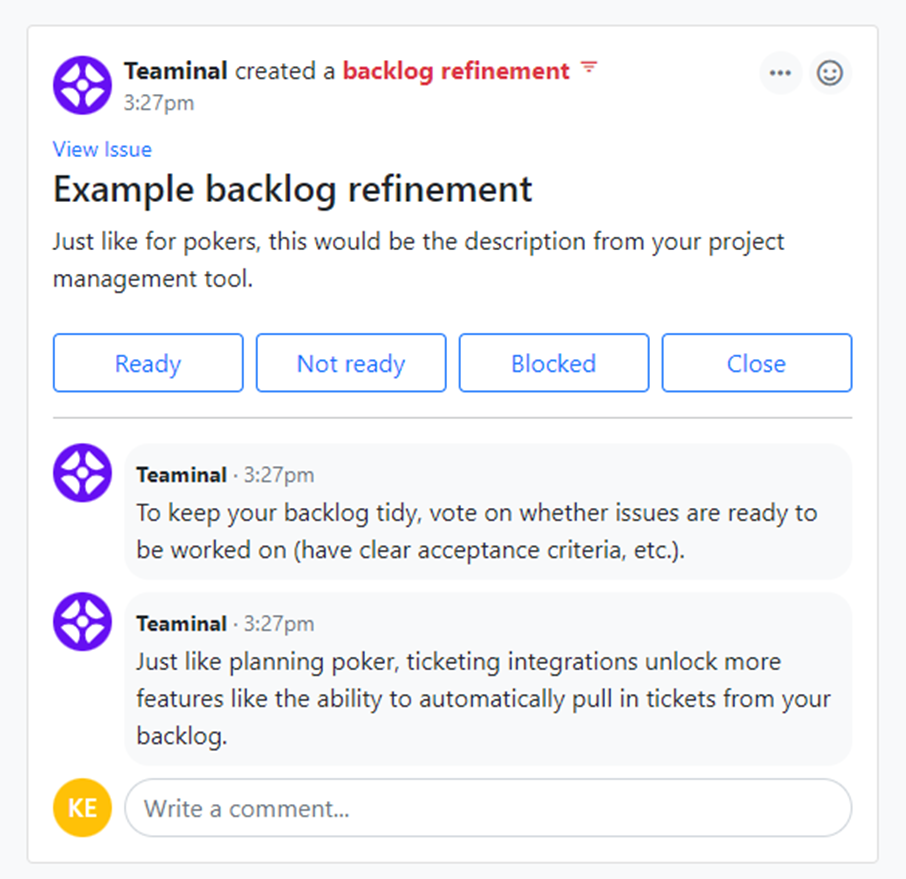
2. Async review and definition
Next, it’s time to review the remaining backlog items with the goal of defining each item with a:
-
Priority
-
User story
-
Acceptance criteria
Teaminal’s role here is facilitating async collaboration through easy-to-follow comment threads.
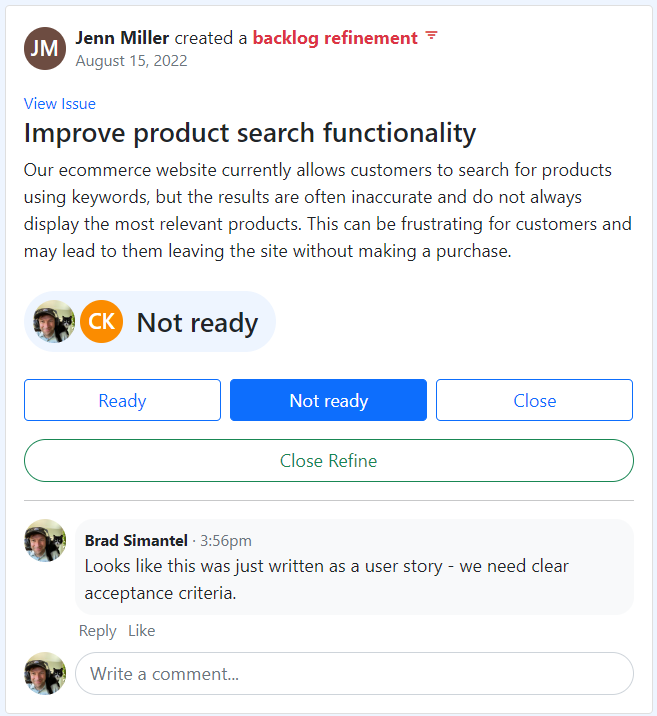
Your team can review and discuss each item, making decisions together on priority and user stories. This helps ensure that everyone is aligned on the goals and expectations for each backlog item before development begins. If a team member feels that an item isn’t well-defined, they can vote with a single click.
Async meetings have the added benefit of saving a significant amount of time and reducing switching costs for your team. There are no 45-minute all-hands meetings with Teaminal—if a developer isn’t directly involved with a discussion, they can follow along with the comment threads without sacrificing their time.
3. Voting and shaping
Once all items have been reviewed and assigned their priority and user story, it’s time to shape them into actionable tasks. This involves breaking down each backlog item into smaller, more manageable tasks.
Planning poker is a powerful tool here—allowing team members to vote on the complexity of each task and coming to a consensus on the level of effort required for completion. This not only ensures that everyone is on the same page, but it also helps identify any potential roadblocks or dependencies that may arise.
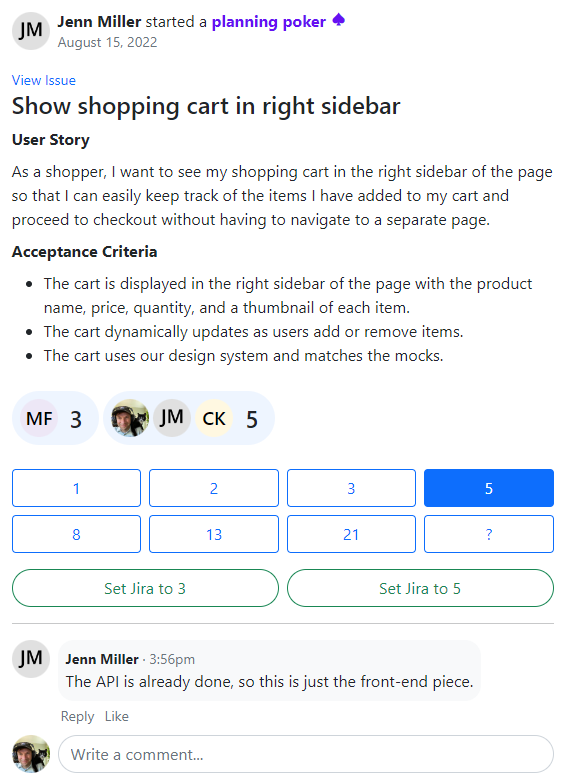
With Teaminal, you can host async planning poker sessions where team members can cast their votes and discuss any concerns or questions they may have. This eliminates the need for time-consuming in-person meetings and allows team members to participate on their own schedule.
Once you’re finished voting, story points are automatically pushed to Jira.
4. Clarification and discussion
Ambiguities or questions about tickets are bound to crop up.
With Teaminal, these issues can be easily resolved through the discussion feature. Team members can initiate a discussion thread on specific tickets and tag relevant team members to get their input. This eliminates the need for lengthy email chains or waiting for in-person meetings to discuss ticket details.
Team managers can also use this feature to monitor team progress and jump in if there are any urgent matters that need attention. Discussions can also be used as a knowledge base for future reference, making it easier for new team members to catch up on previous discussions and decisions.
5. Continuous improvement
Backlog refinement meetings, sprint retrospectives, and team discussions are all essential in continuously improving team efficiency and productivity. With Teaminal, you can easily track progress, identify areas for improvement, and implement changes to optimize your workflow.
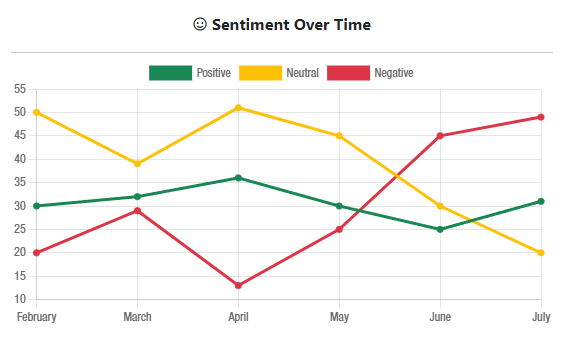
Our built-in analytics and reporting tools provide valuable insights to help your team make data-driven decisions for continuous improvement. Track team sentiment over time, analyze discussion trends, and more to keep your team operating at its best.
Conclusion
Conducting backlog refinement meetings requires smooth and continuous communication. This is where Teaminal’s platform comes in, facilitating collaboration and feedback. By implementing effective communication strategies, teams can enhance their delivery process and achieve better outcomes.
At Teaminal, we simplify backlog refinement through powerful async collaboration tools designed specifically for Agile teams. Conduct all your Agile rituals without wasting time with unnecessary face-to-face meetings.
Get started for free today.

